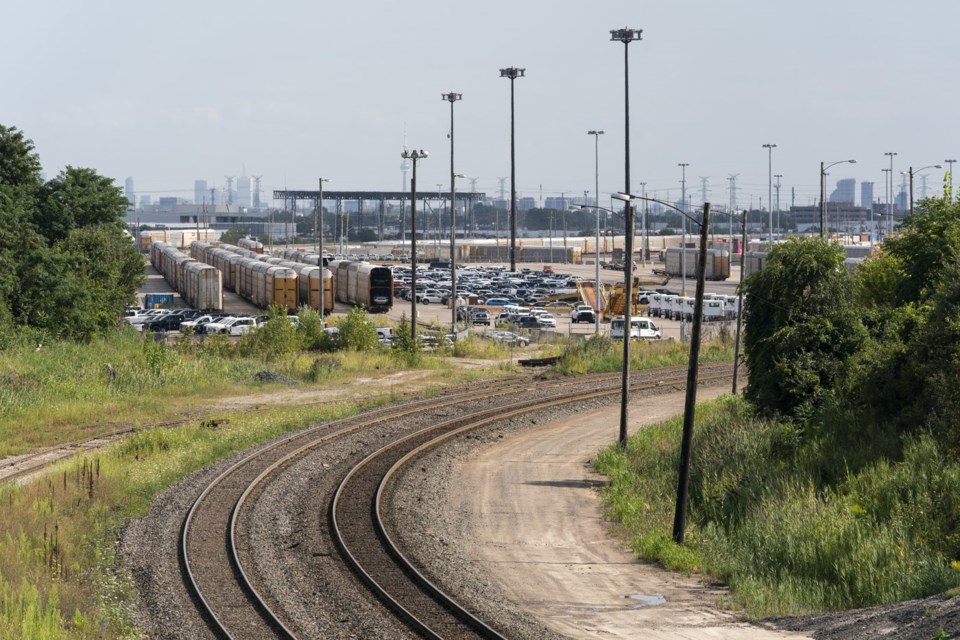MONTREAL — An obscure but hard-fought — and hard-lobbied — battle over railway competition has steamed back to the surface.
A pilot project that aims to give farmers, manufacturers and wholesalers more choice in their rail service is set to expire before a prorogued Parliament returns, with shippers and railways squaring off over its demise.
In 2023, the federal government temporarily increased the distance railways are required to haul goods being shipped by their competitors, a practice known as extended inter-switching.
It refers to the transfer of cargo between two railway companies at a point where their tracks meet. Extended inter-switching is when Company A must transport that cargo farther along its own tracks to a point where it meets Company B’s rails.
The pilot expanded the inter-switching zone to 160 kilometres from 30 kilometres in the three Prairie provinces for an 18-month period.
The practice seeks to spur competition and lower prices, as operators shipping from a grain elevator on Canadian National Railway Co. tracks, for example, could choose to have the freight transported by Canadian Pacific Kansas City Ltd. instead if the rate is better and a handoff point is within range.
The experiment is set to expire on March 20, four days before the House of Commons returns from prorogation and would need to be extended via legislation to continue.
Grain Growers of Canada executive director Kyle Larkin says the new rule has drastically increased the number of producers with access to two railways rather than one, enhancing competition and efficiency on the tracks.
"It’s the only policy that can promote competition between the dual monopolies that we see across the Prairies," said Larkin, whose group represents more than 70,000 farmers.
"Because grain elevators are tied to specific rail lines and because they can dictate the terms and dictate the price, that means that the extra cost that shippers are having to incur is passed down the value chain to grain farmers."
Larkin also argued that a lack of competition breeds inefficient rail operations, which can lead to backlogs at grain elevators.
The federal pilot awoke Canada’s two railway giants, prompting them to warn of the deep harm they say it will inflict.
The Railway Association of Canada, which represents CN and CPKC, said shippers already enjoy some of the lowest freight rates globally and called extended inter-switching a "failed policy" that should be ditched for good.
The group warned that U.S. railroad operators can now reach into Canada and snap up shipments handed over involuntarily by domestic railways, costing employees their jobs. Teamsters Canada, which represents 16,000 railworkers, has also raised the spectre of layoffs.
"From the get-go, there have been no new competitive options created with extended regulated inter-switching in place," the railway association said in an emailed statement.
The move will also prolong transit times, boost diesel emissions and raise costs for consumers and producers, according to the railways.
Some industry groups sought to highlight contradictions in the claims.
John Corey, president of the Freight Management Association of Canada, questioned how a policy that creates no new competitive options could also open the gates to U.S. competitors.
"The railways have just finished telling us that they have the lowest rates in the world. If you have the lowest rates, how can somebody eat your lunch?" he asked.
"All they have to do is match the price of the competing railway and they'll keep that traffic for themselves."
The railways did not hold back on attempts to influence politicians in the run-up to the pilot project kickoff in 2023.
Lobbyists with Canadian Pacific had 96 meetings with public office holders in the first four months of 2023, the same number it posted through all of 2022, according to the federal lobbyist registry. More than 30 involved civil servants – mainly Transport Canada’s – or ministerial offices. Another 10 were sit-downs with House of Commons or Senate transport committee members. The Railway Association of Canada filed 17 lobbying reports in the first five months of 2023 compared with seven for the entirety of 2022.
The budget bill that the pilot passed in June 2023.
This report by The Canadian Press was first published Jan. 20, 2025.
Christopher Reynolds, The Canadian Press


